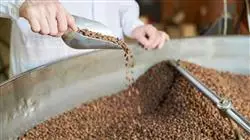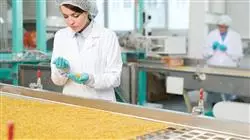University certificate
The world's largest faculty of nutrition”
Introduction to the Program
Do not miss this great opportunity and become a prestigious nutritionist who is able to successfully employ analytical techniques in quality control"

Quality control of processes and products is essential to ensure food safety and to guarantee Good Manufacturing and Elaboration Practices (GMP) in the processes carried out in the food industry. For this reason, the Analytical and Instrumental Techniques module highlights the tools that guarantee food safety, which are mandatory and under the responsibility of the producers, either by controls of the food industry's own laboratories or by outsourcing the service to food and reference laboratories for the control of raw materials and products.
Moreover, R&D&I systems are presented in the development of new foods across the food industry that require new technologies, new processes and food safety systems that are increasingly specific and adapted to the characteristics of new foods. This program is the most complete among the different specializations offered by universities today, because it is oriented according to parameters of excellence, from the content to the teaching staff.
The teaching staff on this Postgraduate diploma are university professors and professionals from various disciplines in primary production, the use of analytical and instrumental techniques for quality control, the prevention of accidental and intentional contamination and fraud, food safety/food integrity and traceability (food defence and food fraud/food authenticity). They are experts in food legislation and regulations on quality and safety, validation of methodologies and processes, digitalization of quality management, research and development of new foods and finally, the coordination and execution of R&D&I projects. This educational project has been designed with the commitment to train qualified professionals in the field. A program devised by specialists in each specific subject, who meet new challenges every day and who are committed to preparing students for the future.
Applying quality controls in the creation of new foods is essential for their subsequent commercialization and consumption"
This Postgraduate diploma in Analytical Techniques in R&D&I Project Quality Control contains the most complete and up-to-date scientific program on the market. Its most notable features are:
- Case studies presented by experts in food safety at the nutritional level
- The graphic, schematic, and practical contents with which they are created, provide scientific and practical information on the disciplines that are essential for professional practice
- The latest news on Analytical Techniques in R&D&I Project Quality Control
- Practical exercises where self-assessment can be used to improve learning
- Its special emphasis on innovative methodologies in Analytical Techniques in R&D&I Project Quality Control
- Theoretical lessons, questions to the expert, debate forums on controversial topics, and individual reflection assignments
- Content that is accessible from any fixed or portable device with an Internet connection
Discover the latest news on Analytical Techniques in R&D&I Project Quality Control and relaunch your career as a nutritionist"
The program’s teaching staff includes professional food safety from a nutritional perspective, who bring their experience to this training program, as well as renowned specialists from leading communities and prestigious universities.
The multimedia content, developed with the latest educational technology, will provide the professional with situated and contextual learning, i.e., a simulated environment that will provide immersive specialization programmed to learn in real situations.
This program is designed around Problem-Based Learning, whereby the professional must try to solve the different professional practice situations that arise throughout the program. To that end, professionals will be assisted by an innovative, interactive video system made by recognized and extensively experienced experts in Analytical Techniques in R&D&I Project Quality Control .
You will develop practical cases as presented by experts in food safety at the nutritional level throughout the Postgraduate diploma"

A program that can be taken remotely, 100% online, and adapted to you and to 21st century education"
Why study at TECH?
TECH is the world’s largest online university. With an impressive catalog of more than 14,000 university programs available in 11 languages, it is positioned as a leader in employability, with a 99% job placement rate. In addition, it relies on an enormous faculty of more than 6,000 professors of the highest international renown.

Study at the world's largest online university and guarantee your professional success. The future starts at TECH”
The world’s best online university according to FORBES
The prestigious Forbes magazine, specialized in business and finance, has highlighted TECH as “the world's best online university” This is what they have recently stated in an article in their digital edition in which they echo the success story of this institution, “thanks to the academic offer it provides, the selection of its teaching staff, and an innovative learning method aimed at educating the professionals of the future”
A revolutionary study method, a cutting-edge faculty and a practical focus: the key to TECH's success.
The most complete study plans on the university scene
TECH offers the most complete study plans on the university scene, with syllabuses that cover fundamental concepts and, at the same time, the main scientific advances in their specific scientific areas. In addition, these programs are continuously being updated to guarantee students the academic vanguard and the most in-demand professional skills. In this way, the university's qualifications provide its graduates with a significant advantage to propel their careers to success.
TECH offers the most comprehensive and intensive study plans on the current university scene.
A world-class teaching staff
TECH's teaching staff is made up of more than 6,000 professors with the highest international recognition. Professors, researchers and top executives of multinational companies, including Isaiah Covington, performance coach of the Boston Celtics; Magda Romanska, principal investigator at Harvard MetaLAB; Ignacio Wistumba, chairman of the department of translational molecular pathology at MD Anderson Cancer Center; and D.W. Pine, creative director of TIME magazine, among others.
Internationally renowned experts, specialized in different branches of Health, Technology, Communication and Business, form part of the TECH faculty.
A unique learning method
TECH is the first university to use Relearning in all its programs. It is the best online learning methodology, accredited with international teaching quality certifications, provided by prestigious educational agencies. In addition, this disruptive educational model is complemented with the “Case Method”, thereby setting up a unique online teaching strategy. Innovative teaching resources are also implemented, including detailed videos, infographics and interactive summaries.
TECH combines Relearning and the Case Method in all its university programs to guarantee excellent theoretical and practical learning, studying whenever and wherever you want.
The world's largest online university
TECH is the world’s largest online university. We are the largest educational institution, with the best and widest online educational catalog, one hundred percent online and covering the vast majority of areas of knowledge. We offer a large selection of our own degrees and accredited online undergraduate and postgraduate degrees. In total, more than 14,000 university degrees, in eleven different languages, make us the largest educational largest in the world.
TECH has the world's most extensive catalog of academic and official programs, available in more than 11 languages.
Google Premier Partner
The American technology giant has awarded TECH the Google Google Premier Partner badge. This award, which is only available to 3% of the world's companies, highlights the efficient, flexible and tailored experience that this university provides to students. The recognition as a Google Premier Partner not only accredits the maximum rigor, performance and investment in TECH's digital infrastructures, but also places this university as one of the world's leading technology companies.
Google has positioned TECH in the top 3% of the world's most important technology companies by awarding it its Google Premier Partner badge.
The official online university of the NBA
TECH is the official online university of the NBA. Thanks to our agreement with the biggest league in basketball, we offer our students exclusive university programs, as well as a wide variety of educational resources focused on the business of the league and other areas of the sports industry. Each program is made up of a uniquely designed syllabus and features exceptional guest hosts: professionals with a distinguished sports background who will offer their expertise on the most relevant topics.
TECH has been selected by the NBA, the world's top basketball league, as its official online university.
The top-rated university by its students
Students have positioned TECH as the world's top-rated university on the main review websites, with a highest rating of 4.9 out of 5, obtained from more than 1,000 reviews. These results consolidate TECH as the benchmark university institution at an international level, reflecting the excellence and positive impact of its educational model.” reflecting the excellence and positive impact of its educational model.”
TECH is the world’s top-rated university by its students.
Leaders in employability
TECH has managed to become the leading university in employability. 99% of its students obtain jobs in the academic field they have studied, within one year of completing any of the university's programs. A similar number achieve immediate career enhancement. All this thanks to a study methodology that bases its effectiveness on the acquisition of practical skills, which are absolutely necessary for professional development.
99% of TECH graduates find a job within a year of completing their studies.
Postgraduate Diploma in Analytical Techniques in the Quality Control of R&D&I Projects
The food industry is a key sector in the world economy and, therefore, its safety is of great importance. In this context, the implementation of analytical techniques for quality control in research, development and innovation projects is vital. For this reason, a large number of professionals in this field are required to generate first class consumer products. Because of this, TECH has created the Postgraduate Diploma in Analytical Techniques in the Quality Control of R&D&I Projects, which will specialize you in this field and boost your development in this sector.
Learn online and from the place of your choice.
Manage, through the Postgraduate Diploma in Analytical Techniques in the Quality Control of R&D&I Projects, the advanced methods to measure the quality of meat, dairy or juice products or delve into the intricacies of the design of innovative low-sugar and low-fat products. All your learning will be guided by top specialists in food safety and chemical composition, who will provide you with the knowledge that will be most useful in your professional life.







